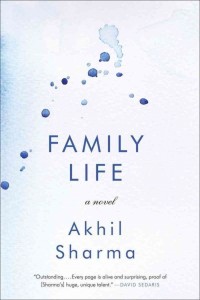224 pages, $23.95
Review by Jean-Luc Bouchard
Deadpan delivery is often associated with the sets of stand-up comedians, but in hands of an author whose themes are ultimately trauma and tragedy, deadpan delivery can be as haunting as it can be deceptively neutral. In Akhil Sharma’s second novel, Family Life, the protagonist Ajay recounts his adolescence spent in transition from India to New Jersey with a nearly numb, matter-of-fact nature that occasionally results in readers’ guilty snickers, but more often steers them into cringing sadness. Sharma presents his audience an austere glimpse into the life of the Mishra family, whose seemingly traditional immigrant story is uprooted by a crisis of health and duty when Ajay’s brother Birju is left severely brain damaged after a swimming accident.
The details of Birju’s health and his family’s commitment to his care, which act as a weighty integument for the novel’s second half, are horrific and blunt; there is no attempt to hide the unpleasantness of his stomach tubes and waste-stained baths. The trauma Ajay suffers as a result of a childhood spent caring for his half-dead brother is relayed not through any empathetic stream of emotion, but rather through a collage of his everyday observations and interactions with his parents, which are stark but scathing:
“I used to think that my father had been assigned to us by the government. This was because he appeared to serve no purpose.”
“I had not told anyone at school about Birju. I had been afraid that if I did, they would misunderstand in the same way that the women at the Ramayan Path had misunderstood, and then their confusion would remind me that what happened to Birju did not matter to most of the world.”
Ajay’s opinions are presented as law, and his total certainty on matters of perspective leave the reader equal parts skeptical to his authority, stunned by his honesty, and addicted to the frankness of his voice:
“The nursing home that Birju was in was not good.”
“It seemed obvious that God was more likely to help people who were good than those who were ordinary. This is why it felt very important that we behave impeccably. My parents refused to do this, however.”
The sharp but surface-level nature of the narration makes Sharma’s themes—family strife, loss, and struggle—palatable, striking chords of sadness and worry without drowning the reader in the kind of self-reflexive spiraling found in traditional, cathartic prose written on similar topics. Sharma, whose recent New Yorker essay outlined his desire to write “A Novel Like a Rocket,” or a novel that was quickly, almost greedily consumed, urging its readers to jump page to page without fatigue, has clearly made readability the focal point of his book. At times, this rocket-like momentum carries the story past moments of consideration or particularly dynamic encounters faster than it should; much is left to the imagination in Family Life, including large chunks of time swept under the rug for the sake of keeping readers on their toes, lest they decide to start skimming paragraphs.
But if reading like a rocket was Sharma’s goal, than Family Life is evidence of his success; its two hundred and twenty-four pages can be devoured so quickly it may leave the reader feeling something akin to backlash. Amidst the plainly-stated details of Indian American life and the fractures of a family forced to contend with massive loss, a ghost of sentiment is hidden between crisply edited sentences and bare-bones prose. Sharma gives his readers the chance to sit with the dreadful events of his novel, but more likely than not they will choose to run straight through it, finding themselves days or weeks later pondering the strange, small sadness tugging at the back of their minds as they watch a kid diving into a pool or an Indian family out grocery shopping.
***
Jean-Luc Bouchard is a writer living in New York City. His short fiction has been published in the literary magazines Specter, Umbrella Factory, Danse Macabre, Eastlit, 100-Word Story, and Helicon. His portfolio can be found at jeanlucbouchard.com and you can follow him at @jlucbouchard.
![[PANK]](http://pankmagazine.com/wp-content/themes/pank/assets/images/pank-logo-large.png)

